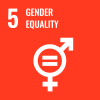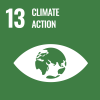
Nisha washes her hands outside the latrine built by IOM, before assisting her mother in preparing a meal. Photo: IOM 2024/Muhammad Zeeshan Siddiqui
With clean water now a luxury, Nisha and her sisters then had to walk for several miles every day to access the now elusive resource. As a young girl, Nisha grappled with fear, especially during the dark nights when she was forced to relieve herself in the fields, having lost the toilet facility to the floods.
The dire need for water and sanitation facilities saw the construction of latrines and handwashing stations in Nisha's village by IOM. This brought a sense of relief to Nisha and her community, providing her with a safer and more hygienic environment.
“Now, I can use the latrines without fear, even during the darkest hours,” shared Nisha.

Women adorned with traditional bangles collect clean water from a hand pump installed by IOM Pakistan in Mirpurkhas District. Photo: IOM 2024/Muhammad Zeeshan Siddiqui
Accompanied by her mother to a Water, Sanitation, and Hygiene (WASH) session organized by IOM Pakistan and its partner in their village, Nisha alongside other community members were taken through proper hygiene techniques in the face of rising risks associated with water-borne diseases.
Empowered by her newfound knowledge, Nisha took it upon herself to educate her peers at school about proper handwashing techniques, spreading awareness about hygiene management.

Sampa brings back a pot of safe drinking water home from the new lead-line hand pump installed by IOM in her village. Photo: IOM 2024/Muhammad Zeeshan Siddiqui
Sampa, a 55-year-old widow from Mirpurkhas District, sought refuge on the embankment during the floods. Faced with immense challenge and lack of access to clean water, she fell ill after consuming contaminated water.
Similar to Nisha's situation, her home had been damaged by the floods.
With the responsibility of caring for her ten-year-old child weighing heavily on her shoulders, Sampa's struggles were compounded by the scarcity of clean water due to the devastation caused by the floods. Daily tasks became arduous, as she had to trek long distances in the scorching heat to fetch water, which was particularly challenging given her age.

Women collect clean drinking water from a hand pump installed by IOM Pakistan and its partner in their village. Photo: IOM 2024/Muhammad Zeeshan Siddiqui
A lead-line hand pump installed by IOM Pakistan in Sampa’s village, alongside lavatory facilities and handwashing stations, marked a significant improvement in access to clean water and hygiene services. No longer burdened by the arduous trek for water, Sampa could now conveniently access clean water.
"I no longer have back pain from carrying water for miles," Sampa shared. "With access to clean water right here in our village, both my health and the well-being of our community have remarkably improved,” she added.
Sampa’s and Nisha’s stories highlight the transformative impact of access to clean water and sanitation for women and girls. Access to clean water, sanitation and hygiene services are crucial for human health and well-being.
Written by Maha Akbar, communications officer, IOM Pakistan



